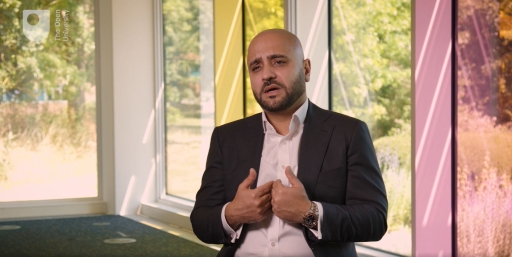1 Changing the culture
There are many different ways to influence change in the inclusion culture within an organisation, and in this section you’ll see a range of examples from various employers.
It may be reassuring to first hear Asif Sadiq explaining that this doesn’t necessarily require significant financial investment!

Transcript: Video 2: Investment in DEI
Training sessions and diversity initiatives
Many employers offer training to their workforce on topics such as unconscious bias or other aspects of diversity. The following example highlights a successful approach:
US based marketing services firm Ansira (Fister Gale, 2020)
A key takeaway is the trainer’s approach, which is interactive and story-driven. He describes the sessions as ‘more of a conversation than a lecture’. He deliberately doesn’t dictate what learners should do or say, explaining ‘you never want to accuse, you have to let people do their own self-analysis.’
An example of this is using ‘I couldn’t help but notice…’ when responding to biased behaviour. In the article, the trainer shares the example of a female CEO who was asked at a CEO conference who her husband was. By saying ‘I couldn’t help but notice you assumed I’m a spouse and not a CEO. Why did you make that assumption?’ she forced the questioner to do his own self-analysis, rather than accusing him of bias and putting him on the defensive.
Depending on the focus of the training, it might be more appropriate to target key groups, rather than offering it to the whole workforce.
The Local Government Association (no date) offers a range of ‘Weekender’ events and programmes to young councillors (aged 40 and under), LGBTQ+ councillors and councillors from Black, Asian and minority ethnic backgrounds. These events provide participants with opportunities to build support networks and develop personal, political and leadership skills, providing a bridge to more senior leadership positions.
A 6-month bespoke leadership programme for disabled councillors also provides training and networking opportunities.
Their Equality, Diversity and Inclusion E-Learning module explores how councillors can act as effective community leaders to build social inclusion. In addition, the module looks at how non compliance with the Equality Act 2010 can lead to issues around discrimination, harassment and victimisation for councillors in their roles.
Reverse mentoring
Mentoring can provide a useful conduit for conversations and communication, and reverse mentoring offers the opportunity for a junior team member to mentor a senior colleague. In the context of diversity and inclusion, this allows them to share their experience of diversity and discrimination with someone who can use this learning to make a difference. This type of activity also contributes to changing the culture.
Clifford Chance – reverse mentoring with clients (2020)
Senior manager Kalela Mwenya shares her experience of reverse mentoring on the topic of ethnicity:
‘For me, it is the opportunity for mutual learning that makes reverse mentoring so worthwhile […] I also believe that being paired with someone outside the firm helps to provide a healthy comparison in terms of what other organisations are doing, forcing me to be more objective in my thinking.’
‘We both offer important discussion points, which has triggered uncomfortable feelings, but that’s okay, as this is how we broaden perspectives.’
‘I truly believe these conversations are drawing us closer to our clients, with many positives resulting from the desire to work together to make progress.’
Many law firms have embraced the value of reverse mentoring so LawCare and the University of Leeds (no date) have created a reverse mentoring toolkit aimed at supporting any organisation in the legal sector to design a thoughtful and collaborative programme with clear goals and a realistic structure. While the kit has a strong focus on the legal profession, the sections on preparation and delivery are packed with useful advice that could be relevant to any organisation. Find the link to the toolkit in References.
Compass Group UK & Ireland (2024)
Now in its third cohort, the Compass Group reverse mentoring programme was developed to build a shared understanding of the barriers, challenges and opportunities for colleagues from ethnic minority groups.
It partners senior leaders (mentees) with individuals from ethnic minority groups (mentors) encouraging them to share their experiences, perspectives and knowledge.
One participant shared the following feedback:
‘The reverse mentor programme was an experience outside my comfort zone, yet it was enlightening to both my professional and personal growth. My mentee and I were very open about our experiences and for this reason we’ve kept in touch so we can continue having the important and sometimes difficult conversations that will be beneficial to both of us and our contribution to Compass. I enjoyed taking part in the programme and would certainly recommend it to any colleagues considering joining.’
Diversity ambassadors
Although HR staff are often key drivers of diversity and inclusion initiatives, in order to create a sense of shared responsibility, it can be useful to give different roles across the organisation an opportunity to champion key initiatives:
Heineken’s inclusion & diversity ambassadors (Thorre, 2019)
Inclusion and diversity (I&D) ambassadors work with local teams to respond to local opportunities and issues around the world. For example:
- In Poland, the focus has been on the differences and similarities between different generations in the workplace.
- Heineken France organised LGBTQ+ workshops and awareness building activities.
- In Serbia, they focused on Orthodox and Catholic specificities around the calendar and holidays.
- Heineken Italy launched a digital life-based training program to support careers and personal parenting challenges, improving parental leave management and transforming parenting skills into powerful capabilities.
Activity 1 Training ideas
Spend a few minutes reflecting on these examples and consider if there are any ideas you’d like to develop. Make notes in the box below.
Comment
Learning from the ideas and actions of others can be inspirational! It might not be practical for your organisation to directly replicate their activity, but a version of it or another activity that captures its intention could work well.
